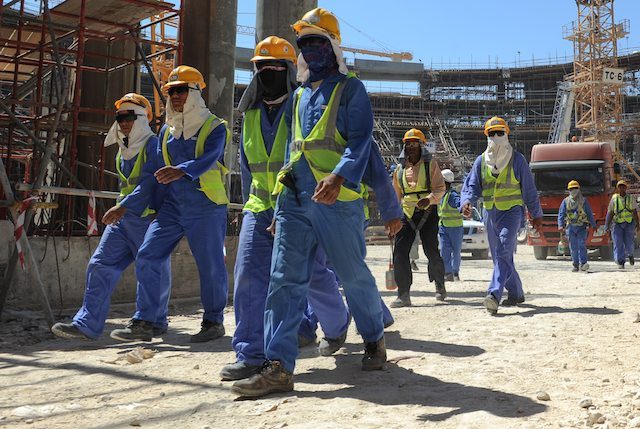SUMMARY
This is AI generated summarization, which may have errors. For context, always refer to the full article.

DOHA, Qatar – Qatar’s labor minister said Monday, May 4, he hopes the country’s controversial “kafala” system, which critics have likened to modern-day slavery, will be abolished before the end of this year.
Dr Abdullah bin Saleh al-Khulaifi, the minister of labor and social affairs, said he was “90%” certain the system would be replaced within the next 7 months.
“I hope it will be prior to the year end,” said Khulaifi.
“We discussed it, our stakeholders have looked at it… Now it is on track.
“Do I believe it will come out positively? Yes, I do. Because at the end of the day I believe it is good for the economy, it’s good for the country.”
Asked if the scheme would be abolished by the end of the year, Khulaifi replied: “I am 90% hopeful or believe that it will be.”
Under kafala, employers can prevent foreign workers from changing jobs or leaving the country.
Long condemned by rights groups, the system has become a major focus of criticism since Qatar was awarded the 2022 football World Cup, as the country’s labor laws come under increasing international scrutiny.
Abolition of kafala would represent the biggest reform of Qatar’s labor market.
Doha says it will replace the system with one based instead on employment contracts.
These contracts would last a maximum of 5 years and the current exit permit system would be replaced with one where workers give the authorities a maximum of 72 hours’ notice that they want to leave the country.
Khulaifi also said Qatar would fully implement another major labor reform – an electronic payment system for thousands of migrant laborers – by mid-August.
This would ensure that up to one million workers get paid at least once a month and, in some cases, every fortnight.
However, the reforms do not go far enough for some.
Mustafa Qadri, Amnesty’s Gulf migrant rights researcher, welcomed any change but said more was needed.
“It’s another form of kafala with a different name, admittedly less restrictive but with many of the same problems.”
He added that contract arrangements and the ability to leave the country for workers under the proposed changes would “still be a situation of forced labor because the employer still has the power over the employee.” – Rappler.com
Add a comment
How does this make you feel?
There are no comments yet. Add your comment to start the conversation.